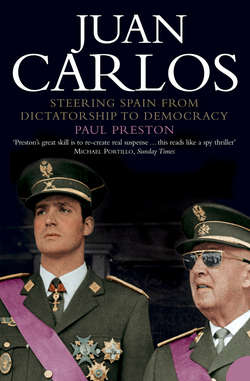Juan Carlos: Steering Spain from Dictatorship to Democracy

Реклама. ООО «ЛитРес», ИНН: 7719571260.
Оглавление
Paul Preston. Juan Carlos: Steering Spain from Dictatorship to Democracy
JUAN CARLOS
PAUL PRESTON
CONTENTS
CHAPTER ONE In Search of a Lost Crown 1931–1948
CHAPTER TWO A Pawn Sacrificed 1949–1955
CHAPTER THREE The Tribulations of a Young Soldier1955–1960
CHAPTER FOUR A Life Under Surveillance 1960–1966
CHAPTER FIVE The Winning Post in Sight1967–1969
CHAPTER SIX Under Suspicion1969–1974
CHAPTER SEVEN Taking Over1974–1976
CHAPTER EIGHT The Gamble1976–1977
CHAPTER NINE More Responsibility, Less Power:the Crown and Golpismo 1977–1980
CHAPTER TEN Fighting for Democracy1980–1981
CHAPTER ELEVEN Living in the Long Shadow of Success1981–2002
BIBLIOGRAPHY
NOTES. ONE: In Search of a Lost Crown
TWO: A Pawn Sacrificed
THREE: The Tribulations of a Young Soldier
FOUR: A Life Under Surveillance
FIVE: The Winning Post in Sight
SIX: Under Suspicion
SEVEN: Taking Over
EIGHT: The Gamble
NINE: More Responsibility, Less Power: the Crown and Golpismo
TEN: Fighting for Democracy
ELEVEN: Living in the Long Shadow of Success
INDEX
ACKNOWLEDGEMENTS
About the Author
Praise
Also by the Author
Copyright
About the Publisher
Отрывок из книги
A People’s King
Title Page
.....
On 2 February 1946, Don Juan and his wife moved to the fashionable but sleepy seaside resort of Estoril, west of Lisbon. An area of splendid mansions built for the millionaire bankers and shipbuilders of the nearby capital, its silent isolation was disturbed only by the click of chips falling in the casinos. The eight-year-old Juan Carlos, to his considerable distress, was left behind in Switzerland, where he was by now being educated by the Marian fathers in Fribourg. For the first two months in Portugal, his family lived in Villa Papoila, loaned by the Marqués de Pelayo, later moving in March 1946 to the larger Villa Bel Ver. They stayed there until the autumn of 1947 when they moved to Casa da Rocha, until finally in February 1949, they established their residence at Villa Giralda. In 1946, for many of Don Juan’s supporters, his proximity to Spain seemed to shorten the distance that separated him from the throne. His mere presence in the Iberian Peninsula set off a wave of monarchist enthusiasm. The Spanish Foreign Ministry was inundated with requests for visas as senior monarchists set off to pay their respects.74
Franco’s Ambassador to Portugal, his brother Nicolás, quickly established a superficially cordial relationship with Don Juan. However, when Nicolás suggested he drive him to Madrid for a secret meeting with the Caudillo, Gil Robles, Don Juan’s senior adviser, was adamant: ‘Your Majesty cannot go and see Generalísimo Franco on Spanish soil since he would be going there as a subject.’75 Indeed, it had been the expectation of tension with Franco that had led Don Juan to decide that it was better for Juan Carlos to remain in Switzerland. The wisdom of his decision was underlined when the Caudillo lashed out in response to the publication on 13 February 1946 of a letter welcoming Don Juan to the Peninsula, signed by 458 prominent establishment figures. Franco reacted as if he was faced with a mutiny by subordinates rather than an attempt to accelerate a process to which he had publicly committed himself. He told a cabinet meeting on 15 February, ‘This is a declaration of war, they must be crushed like worms.’ In an astonishing phrase, he declared, ‘the regime must defend itself and bite back deeply.’ He relented only after Martín Artajo, General Dávila and others had pointed out the damaging international repercussions of such a move. He then went through the list of signatories, specifying the best ways of punishing each of them, by the withdrawal of passports, tax inspections or dismissal from their posts.76
.....